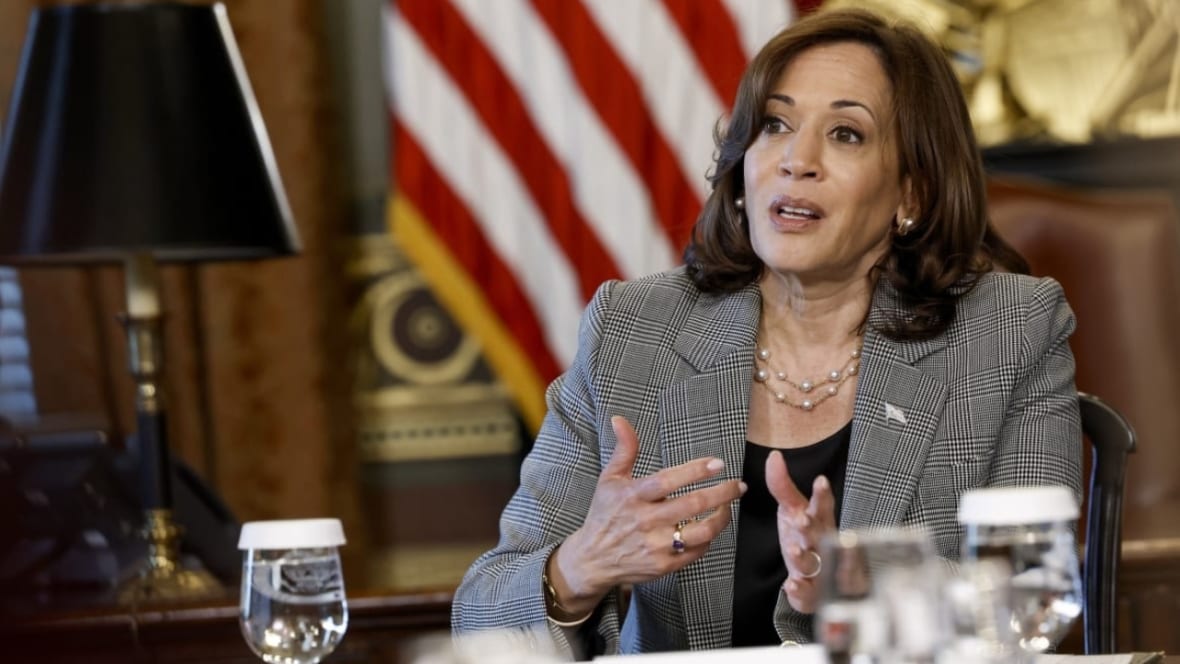Vice President Kamala Harris convened civil rights leaders and experts for a White House meeting to discuss the societal impacts of AI in an effort to learn more from stakeholders about growing concerns with the rapidly advancing technology.
Artificial intelligence is transforming the way people live and how companies operate across the globe by making tasks and services more swift and efficient. But there are also concerns about AI’s potential harm to already vulnerable populations, particularly Black and brown communities. Tech companies have been warned they could also be violating their civil rights in various areas, from housing and health care to the criminal justice system.

“There is a component that has been well documented about the legitimate concerns that many of us have about how racial bias and other types of biases will impact the lives of people because of AI,” said Harris, sitting at a large oval table alongside nearly a dozen participants and White House senior officials inside her ceremonial office.
Harris expressed other concerns — like AI being used to spread misinformation and disinformation online and potentially suppress employment and privacy rights.
“We want to make sure that we are cognizant of and intentional about those populations of people that are particularly vulnerable,” she said. “And then we want to make sure that we are thinking about the impact of this on our systems of justice.”
However, the vice president emphasized that the Biden-Harris administration believes it is a “false choice” to think of AI as either an opportunity for advancement or a tool used for bad.
“Innovation has so much possibility to improve the condition of human life,” Harris explained.
“We must also ensure that in that process,” she added, “we are not trampling on people’s rights.”
Participants in Wednesday’s White House meeting told theGrio they appreciated that Harris had convened it. They described it as a substantive and engaging discussion about the actual impact of AI on everyday people and real solutions to a global challenge rapidly advancing in real time.
Liz Shuler, president of the AFL-CIO, the nation’s largest federation of labor unions, told theGrio she was particularly pleased to hear the White House acknowledging that it is feeling the urgency of the moment, and that “time is not on our side.”
Maya Wiley, president and CEO of the Leadership Conference on Civil and Human Rights, said raising concerns about AI with the White House was to call out not simply the fact that the technology can discriminate, but that it can also “lead to us widening the racial gaps, the income gaps [and] the gender gaps” in various categories.
As an example, Wiley recalled a medical study that exposed a racial bias in health care algorithms between Black and white patients based on how often they visited the doctor. She also referenced a hiring algorithm used by Amazon that discriminated against women because most of the data it used was from the resumes of white men.
Wiley said that more broadly, researchers found that even when there were attempts to “control for overt discrimination,” they found “bias in terms of race and gender in employment algorithms.”
Shuler said that during the meeting, she expressed concerns shared by some of the nearly 13 million AFL-CIO members related to how AI and the advancement of technology in the workplace are “contributing to a lot of fear” over potentially being replaced by AI technology, particularly for Black workers.
“The public sector has been a pathway for disproportionately Black workers to access the middle class, and AI is being talked about right now as a way to make government, quote, more efficient,” said Shuler. “That would have a huge impact on the public sector and a disproportionate impact on workers of color.”
Shuler also raised concerns about the “gigification of work” due to AI technology like ChatGPT.
She told theGrio: “These technologies are being introduced in industries where there are disproportionately workers of color, immigrants, women [and] women of color.
Wiley noted that the U.S. government would have to take critical policy and legal steps in order to protect consumers and workers from the harms of AI.
“We, as a civil rights community, want to see real meaningful regulation [and] implementation of some of the really important work this administration has already done,” she told theGrio.
Wiley said enforcing laws that are already on the books could serve as a powerful tool for the federal government under Title VI of the Civil Rights Act of 1964. But she also wants the White House to “prevent the discrimination” and “widening of inequities” before a company hypothetically violates civil rights protections.
“We need to make sure that companies are being accountable [and] transparent in identifying and preventing problems before they start,” she said, “because we’d rather prevent people from being harmed than litigate after they are.”
Dr. Arati Prabhakar, director of the White House Office on Science and Technology Policy, noted that four federal agencies — the Equal Employment Opportunity Commission, the Consumer Financial Protection Bureau, the Federal Trade Commission and the Civil Rights Division of the Department of Justice — sent a joint statement to tech companies vowing to monitor the development and use of AI and enforce the law where violations are identified.
“Many of these things that we’re concerned about with AI are already against the law,” Prabhakar told theGrio.
In addition to its efforts to curb the misuse of AI, the White House official said the administration also is working with Congress on developing legislation spearheaded by Senate Majority Leader Chuck Schumer.
Prabhakar said concerns about AI are also a “global issue and not just a U.S. issue.” She noted that the administration is “also working with our like-minded partners around the world.”
Rep. Emilia Sykes, D-Ohio, who sits on the House Science, Space, and Technology Committee, said in a statement to theGrio that while AI has the potential to improve the lives of Americans, she strongly supports policies that will “ensure artificial technology is deployed equitably, including measures to support and bolster representation in the AI workforce, prevent harmful biases, and protect Americans’ fundamental right to privacy.”
“It could also cause significant harm if we do not consider the potential ethical, safety, and security consequences for our communities,” Sykes added. “It will take an interdisciplinary approach to ensure this ever-evolving technology benefits all Americans.”
Wiley and Shuler praised Harris for her leadership on the issue of AI.
“We are fortunate to have a vice president who’s both so knowledgeable, so engaged and actively interested — not just in listening and learning, but in figuring out solutions,” Wiley told theGrio.
Shuler similarly said: “You couldn’t ask for a more competent and qualified leader on this issue than Vice President Harris because of her track record as [attorney general] of California …. [and] in the Senate.”
During her remarks on Wednesday, Harris said the number-one priority for the Biden-Harris administration is the safety of Americans.
“We’re going to continue to do this work together,” she said, “with a sense of urgency and commitment to solutions.”
Gerren Keith Gaynor is a White House Correspondent and the Managing Editor of Politics at theGrio. He is based in Washington, D.C.
TheGrio is FREE on your TV via Apple TV, Amazon Fire, Roku and Android TV. Also, please download theGrio mobile apps today!

